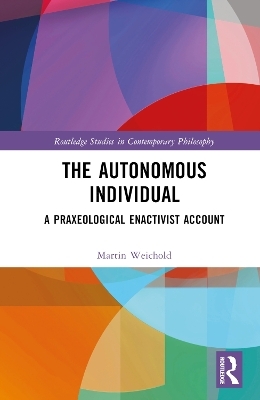
The Autonomous Individual
A Praxeological Enactivist Account
Seiten
2024
Routledge (Verlag)
978-1-032-79097-8 (ISBN)
Routledge (Verlag)
978-1-032-79097-8 (ISBN)
This book advances a new theory of what it means to be an autonomous individual with free will and an authentic self. It synthesizes the new “action turn” from 4E cognitive science with the new “practice turn” from the social sciences to develop a new perspective on our self-interpretation as autonomous individuals.
Our entire life is built upon one central foundation: the idea that we human beings are autonomous individuals. While this idea is presupposed in some academic fields, such as law and moral philosophy, it is challenged or denied in others. This book aims to move beyond debates about whether free will exists. Instead, it proposes that the idea that human beings are autonomous individuals is a culturally developed self-interpretation that is permanently enacted in social practices. Parts of it describe biological reality correctly, parts are social reality, and parts are mere fictions. This view – which the author calls "praxeological enactivism" – combines work from enactive cognitive science with practice theory from the social sciences. The book concludes by discussing the ethical advantages and dangers of the idea of the autonomous individual.
The Autonomous Individual will appeal to philosophers working on free will and autonomy, moral philosophy, and philosophy of social sciences, as well as scholars and advanced students in disciplines such as cognitive science, sociology, cultural theory, and philosophical anthropology.
Our entire life is built upon one central foundation: the idea that we human beings are autonomous individuals. While this idea is presupposed in some academic fields, such as law and moral philosophy, it is challenged or denied in others. This book aims to move beyond debates about whether free will exists. Instead, it proposes that the idea that human beings are autonomous individuals is a culturally developed self-interpretation that is permanently enacted in social practices. Parts of it describe biological reality correctly, parts are social reality, and parts are mere fictions. This view – which the author calls "praxeological enactivism" – combines work from enactive cognitive science with practice theory from the social sciences. The book concludes by discussing the ethical advantages and dangers of the idea of the autonomous individual.
The Autonomous Individual will appeal to philosophers working on free will and autonomy, moral philosophy, and philosophy of social sciences, as well as scholars and advanced students in disciplines such as cognitive science, sociology, cultural theory, and philosophical anthropology.
Martin Weichold is Lecturer in Practical Philosophy at the Institute of Philosophy, Dresden University of Technology, Germany. He is the author of a book on rationality in unreflective action (2015), as well as of numerous articles on enactive cognitive science, practice theory, and ethics.
1. The Whole Book in One Chapter 2. Explaining Findings about the Human Condition 3. Praxeological Enactivism 4. How Human Organisms Come to Interpret Themselves as Autonomous Individuals 5. Disentangling the Biological Reality, Social Constitution, and Fictional Dimensions of the Idea of the Autonomous Individual 6. Normative Self-Fictionalism
| Erscheinungsdatum | 10.07.2024 |
|---|---|
| Reihe/Serie | Routledge Studies in Contemporary Philosophy |
| Verlagsort | London |
| Sprache | englisch |
| Maße | 152 x 229 mm |
| Gewicht | 703 g |
| Themenwelt | Geisteswissenschaften ► Philosophie ► Metaphysik / Ontologie |
| Geisteswissenschaften ► Psychologie ► Allgemeine Psychologie | |
| Geisteswissenschaften ► Psychologie ► Verhaltenstherapie | |
| Sozialwissenschaften | |
| ISBN-10 | 1-032-79097-0 / 1032790970 |
| ISBN-13 | 978-1-032-79097-8 / 9781032790978 |
| Zustand | Neuware |
| Informationen gemäß Produktsicherheitsverordnung (GPSR) | |
| Haben Sie eine Frage zum Produkt? |
Mehr entdecken
aus dem Bereich
aus dem Bereich
eine philosophische Reise
Buch | Softcover (2024)
Goldmann (Verlag)
CHF 19,55


